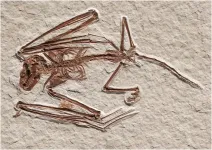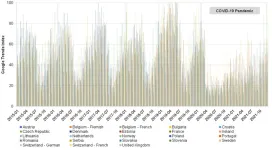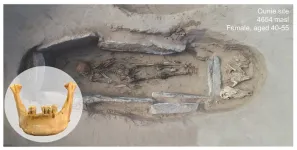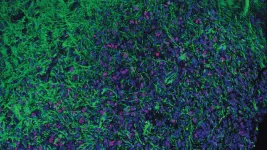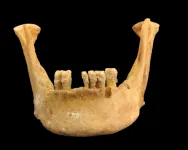(Press-News.org) Key takeaways:
American College of Surgeons research published in JAMA Surgery reveals the complexities and variations that occurred in cancer reporting in the National Cancer Database (NCDB) because of the pandemic.
The number of reported cancer cases in NCDB declined by 14.4% compared with prior years, representing more than 200,000 cancer cases that were not diagnosed and/or treated at accredited facilities.
Research offers guidance to centers across the country on how to interpret data from 2020 and onwards.
CHICAGO: New research from the American College of Surgeons (ACS) outlines significant ways that the COVID-19 pandemic destabilized usual patterns of cancer care as reported in the National Cancer Database (NCDB), one of the largest cancer registries in the world used by thousands of hospitals and centers around the country to inform and improve the quality of cancer care.
The research, published today in JAMA Surgery as a Special Communication article, describes specific ways that NCDB data models were impacted by the pandemic, offering guidance to centers across the country on how to interpret data from 2020 and onwards. The research also paints a much larger picture of the many disruptions caused by the pandemic outside of the immediate emergency of treating COVID-19 patients.
More than 1.1 million Americans have died from COVID-19*, and though pandemic-related restrictions are easing throughout the country, the effects of the pandemic on chronic diseases such as cancer remain largely unknown.
While monitoring real-time data submissions, the ACS Cancer Programs, which manages the NCDB with the American Cancer Society, noted variances in new cancer diagnoses in the first several months of 2020. These variances marked a significant change from the historically stable dataset, which collects more than 1.5 million new cancer cases each year, representing more than 70% of all cancer cases in the United States.
“The pandemic really changed our approach to healthcare in general, but this was especially true for cancer patients who found their care disrupted and for undiagnosed patients who had to delay screening visits,” said first author Sharon Lum, MD, MBA, FACS, former Vice Chair of the Quality Integration Committee of the ACS Commission on Cancer (CoC) and Chair of the Department of Surgery at Loma Linda University School of Medicine. “Many clinicians in the cancer world knew that care for cancer patients was disrupted in many significant ways. But we didn’t really have any solid reporting of that. This research was an attempt to validate and report changes in the trajectory of cancer cases captured by the NCDB in the first year of the pandemic.”
For the study, researchers reviewed 4,045,097 cancer cases from adults 18 years or older who were diagnosed with cancer and/or received their first-course treatment at a reporting facility from January 1, 2018, through December 31, 2020. Reporting facilities included CoC-accredited programs, excluding Veterans Affairs-affiliated programs.
“Our goal was to inform people about what was happening at large in the world of cancer — to provide a global look similar to how a GPS system tells you where you are across the globe — so that centers could create context around their specific datasets,” said Heidi Nelson, MD, FACS, Medical Director of the ACS Cancer Programs and a study co-author. “Rather than dive into specific hypotheses about what may have occurred for each type of cancer, we wanted this research to serve as a point of reference and context because each hypothesis for cancer is different. Each disease is going to have its own series of hypotheses.”
Key findings
The study offers a detailed look into the complexities and variations that occurred in cancer reporting as a result of the pandemic. Among the key findings:
The COVID-19 pandemic was associated with significant changes in diagnoses of all cancer types in 2020, with a 14.4% overall decline in the number of reported cancer cases in the NCDB compared with the prior year. This decline represents more than 200,000 cancer cases that were not diagnosed and/or treated at CoC facilities.
These missing cancer cases are expected to appear in 2021 data and beyond, potentially at more advanced stages.
Overall, the proportion of patients diagnosed with early-stage disease decreased from March to June 2020, followed by a corresponding increase in the proportion of those diagnosed with late-stage disease, peaking in April 2020 and correcting to prior years’ percentages by July 2020. However, the 2020 stage distributions for specific types of cancer varied.
The study identified differences across sociodemographic data. Overall, the proportion of White patients with cancer significantly increased, while the proportion of Asian or Pacific Islander, Hispanic, Black, and other/unknown patients with cancer significantly decreased. This finding suggests that certain racial and ethnic groups were less likely to be diagnosed with cancer and/or receive cancer care, potentially exacerbating existing health disparities in cancer treatment.
Significant disparities were noted between age groups, with increases in cancer rates in people 60 to 69 years old and 70 to 79 years old, and decreases in age of diagnosis in younger and older age categories throughout 2020. This finding suggests that patients younger than 60 and those older than 80 were less likely to be diagnosed or treated for cancer compared with past years.
Understanding the pandemic’s lasting effects
Dr. Lum and Dr. Nelson noted that future research needs to be done to better understand the lasting effects of the pandemic, including how COVID-19 infection impacted or exacerbated chronic diseases, treatment adherence and outcomes, and long-term follow-up of the 14.4% of cancer diagnoses that were not treated as expected in CoC-accredited cancer programs.
Because significant variance was identified in 2020 NCDB data compared with prior years, the authors recommend that centers publishing information with NCDB data include the following disclaimer language in publications using 2020 NCDB data: “This study includes data from the year 2020, the first year of the COVID-19 pandemic. Variability in reporting 2020 cases in the NCDB must be considered when interpreting results.”
“My main takeaway is to really look under the hood when using and analyzing NCDB data that from here on out will include data from 2020,” Dr. Lum said. “Because what you assume is happening may not actually be happening, and you have to really take a deep dive into the treatment variables and particular disease process to understand how the pandemic affected cancer care in your program.”
Future analysis of NCDB data may also reveal more details about the pandemic and provide valuable information to healthcare organizations about how to be better prepared for emergencies.
“Particularly in the first three months of the pandemic, healthcare resources were significantly diverted and hospitals were overwhelmed. There were so many things we didn’t know that we weren’t prepared for. How could we be?” Dr. Nelson said. “But I don’t think we should bury our heads in the sand to what happened, and not be aware of the negative things that happened to patients besides COVID-19 infection. If anything, this data shows us that you didn’t have to be a COVID-19 patient to suffer during the pandemic.”
This project received no external funding. The NCDB, which is the data source used in the paper, is a joint project of the Commission on Cancer of the American College of Surgeons and the American Cancer Society.
Citation: Lum SS, Browner AE, Palis B, et al. Disruption of National Cancer Database data models in the first year of the COVID-19 pandemic. JAMA Surg. Published online April 12, 2023.DOI:10.1001/jamasurg.2023.0652.
________________________
*National Center for Health Statistics: Weekly Updates by Select Demographic and Geographic Characteristics: www.cdc.gov/nchs/nvss/vsrr/covid_weekly/index.htm
About the American College of Surgeons
The American College of Surgeons is a scientific and educational organization of surgeons that was founded in 1913 to raise the standards of surgical practice and improve the quality of care for all surgical patients. The College is dedicated to the ethical and competent practice of surgery. Its achievements have significantly influenced the course of scientific surgery in America and have established it as an important advocate for all surgical patients. The College has more than 84,000 members and is the largest organization of surgeons in the world. “FACS” designates a surgeon is a Fellow of the American College of Surgeons.
END
COVID-19 pandemic will disrupt cancer reporting for years to come
Research reveals the complexities and variations that occurred in cancer reporting during the pandemic
2023-04-12
ELSE PRESS RELEASES FROM THIS DATE:
Is the language you speak tied to outcome after stroke?
2023-04-12
MINNEAPOLIS – Studies have shown that Mexican Americans have worse outcomes after a stroke than non-Hispanic white Americans. A new study looks at whether the language Mexican American people speak is linked to how well they recover after a stroke. The study is published in the April 12, 2023, online issue of Neurology®, the medical journal of the American Academy of Neurology.
“Our study found that Mexican American people who spoke only Spanish had worse neurologic outcomes three months after having a stroke than Mexican American people who spoke only English or were bilingual,” said study author ...
Archaeological sites at risk from coastal erosion on the Cyrenaican coast, Libya
2023-04-12
Archaeological sites along the Libyan shoreline are at risk of being damaged or lost due to increasing coastal erosion, according to a study published April 12, 2023 in the open-access journal PLOS ONE by Kieran Westley and Julia Nikolaus of Ulster University, UK and colleagues.
The Cyrenaican coast of Eastern Libya, stretching from the Gulf of Sirte to the current Egypt-Libya border, has a long history of human occupation back to the Palaeolithic era, and it therefore hosts numerous important and often ...
Poor family cohesion is associated with long-term psychological impacts in bereaved teenagers
2023-04-12
The death of a parent can affect the health and well-being of children and adolescents, including higher risk of depression. A study published in PLOS ONE by Dröfn Birgisdóttir at Lund University, Lund, Sweden and colleagues suggests poor family cohesion is associated with long-term psychological symptoms among bereaved youth.
Parentally bereaved children are at increased risk for mental illness including depression, anxiety, suicide attempts, and self-injurious behaviors. However, the relationship ...
The stripes of the Lesser Pacific Striped Octopus are as unique as our own fingerprints, enabling scientists to track individuals as they grow
2023-04-12
Article URL: https://journals.plos.org/plosone/article?id=10.1371/journal.pone.0265292
Article Title: Individually unique, fixed stripe configurations of Octopus chierchiae allow for photoidentification in long-term studies
Author Countries: USA
Funding: The authors received no specific funding for this work. END ...
Most retail cannabis may be less potent than claimed, with THC being at least 15% less potent than reported on the label in around 70% of products sampled in Colorado
2023-04-12
Article URL: https://journals.plos.org/plosone/article?id=10.1371/journal.pone.0282396
Article Title: Uncomfortably high: Testing reveals inflated THC potency on retail Cannabis labels
Author Countries: USA
Funding: Headspace Sensory LLC provided funding for purchase of 13 of the 23 Cannabis samples that were included as part of another study [47], but had no other involvement in this study. All other funding was provided by the McGlaughlin Lab at the University of Northern Colorado and by the first author. Mile High Labs provided support for this study in the form of salaries for VJ and JH. The specific roles of these authors are articulated in the ‘author contributions’ ...
New 52 million-year-old bat species discovered in Wyoming, US, is the oldest bat skeleton known
2023-04-12
Article URL: https://journals.plos.org/plosone/article?id=10.1371/journal.pone.0283505
Article Title: The oldest known bat skeletons and their implications for Eocene chiropteran diversification
Author Countries: The Netherlands, USA
Funding: 1) Theodore Roosevelt Memorial Fund of the American Museum of Natural History (TBR) https://www.amnh.org/research/richard-gilder-graduate-school/academics-and-research/fellowship-and-grant-opportunities/research-grants-and-graduate-student-exchange-fellowships/roosevelt-memorial-fund 2) ...
Google Trends reveal how the spread of chickenpox may have been suppressed during the COVID-19 pandemic
2023-04-12
Article URL: https://journals.plos.org/plosone/article?id=10.1371/journal.pone.0283465
Article Title: Impact assessment of immunization and the COVID-19 pandemic on varicella across Europe using digital epidemiology methods: A descriptive study
Author Countries: Sweden, Lithuania, Ireland, USA, Spain
Funding: Funding for this research was provided by Merck Sharp & Dohme LLC, a subsidiary of Merck & Co., Inc., Rahway, NJ, USA (MSD). We confirm that the funder provided support in the form of salaries for Ugne Sabale, Ligita Jarmale, Janice Murtagh, Manjiri Pawaskar, and Goran Bencina, but did not have any additional ...
Got milk? The ancient Tibetans did, according to study
2023-04-12
New research into ancient populations that resided on the Tibetan Plateau has found that dairy pastoralism was being practiced far earlier than previously thought and may have been key to long-term settlement of the region’s extreme environment.
Professor Michael Petraglia, Director of Griffith’s Australian Research Centre for Human Evolution, was part of the international research team that set out to understand how prehistoric populations adapted to the vast, agriculturally poor highlands of the Tibetan Plateau.
The research, ...
From tragedy, a new potential cancer treatment
2023-04-12
Diffuse intrinsic pontine glioma (DIPG) is a lethal pediatric brain cancer that often kills within a year of diagnosis. Surgery is almost impossible because of the tumors’ location. Chemotherapy has debilitating side effects. New treatment options are desperately needed.
Cold Spring Harbor Laboratory Professor Adrian Krainer is best known for his groundbreaking research on antisense oligonucleotides (ASOs)—molecules that can control protein levels in cells. His efforts led to Spinraza®, ...
Dairy foods helped ancient Tibetans thrive in one of Earth’s most inhospitable environments
2023-04-12
The Tibetan Plateau, known as the “third pole”, or “roof of the world”, is one of the most inhospitable environments on Earth. While positive natural selection at several genomic loci enabled early Tibetans to better adapt to high elevations, obtaining sufficient food from the resource-poor highlands would have remained a challenge.
Now, a new study in the journal Science Advances reveals that dairy was a key component of early human diets on the Tibetan Plateau. The study reports ancient ...
LAST 30 PRESS RELEASES:
Striking genomic architecture discovered in embryonic reproductive cells before they start developing into sperm and eggs
Screening improves early detection of colorectal cancer
New data on spontaneous coronary artery dissection (SCAD) – a common cause of heart attacks in younger women
How root growth is stimulated by nitrate: Researchers decipher signalling chain
Scientists reveal our best- and worst-case scenarios for a warming Antarctica
Cleaner fish show intelligence typical of mammals
AABNet and partners launch landmark guide on the conservation of African livestock genetic resources and sustainable breeding strategies
Produce hydrogen and oxygen simultaneously from a single atom! Achieve carbon neutrality with an 'All-in-one' single-atom water electrolysis catalyst
Sleep loss linked to higher atrial fibrillation risk in working-age adults
Visible light-driven deracemization of α-aryl ketones synergistically catalyzed by thiophenols and chiral phosphoric acid
Most AI bots lack basic safety disclosures, study finds
How competitive gaming on discord fosters social connections
CU Anschutz School of Medicine receives best ranking in NIH funding in 20 years
Mayo Clinic opens patient information office in Cayman Islands
Phonon lasers unlock ultrabroadband acoustic frequency combs
Babies with an increased likelihood of autism may struggle to settle into deep, restorative sleep, according to a new study from the University of East Anglia.
National Reactor Innovation Center opens Molten Salt Thermophysical Examination Capability at INL
International Progressive MS Alliance awards €6.9 million to three studies researching therapies to address common symptoms of progressive MS
Can your soil’s color predict its health?
Biochar nanomaterials could transform medicine, energy, and climate solutions
Turning waste into power: scientists convert discarded phone batteries and industrial lignin into high-performance sodium battery materials
PhD student maps mysterious upper atmosphere of Uranus for the first time
Idaho National Laboratory to accelerate nuclear energy deployment with NVIDIA AI through the Genesis Mission
Blood test could help guide treatment decisions in germ cell tumors
New ‘scimitar-crested’ Spinosaurus species discovered in the central Sahara
“Cyborg” pancreatic organoids can monitor the maturation of islet cells
Technique to extract concepts from AI models can help steer and monitor model outputs
Study clarifies the cancer genome in domestic cats
Crested Spinosaurus fossil was aquatic, but lived 1,000 kilometers from the Tethys Sea
MULTI-evolve: Rapid evolution of complex multi-mutant proteins
[Press-News.org] COVID-19 pandemic will disrupt cancer reporting for years to comeResearch reveals the complexities and variations that occurred in cancer reporting during the pandemic




